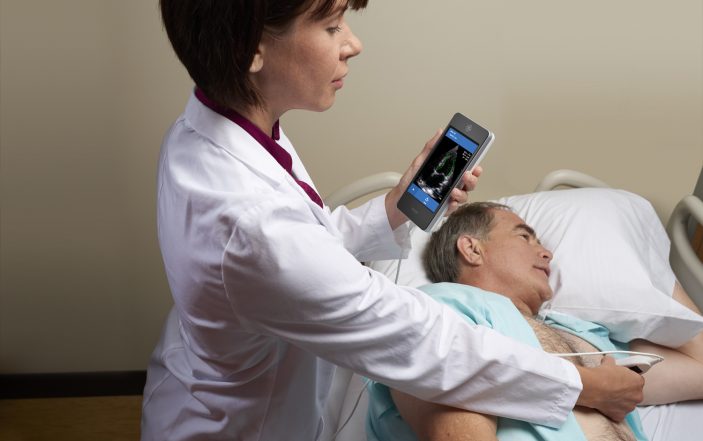Spotlighting a trio of potential technology game changers.
During ACEP18, AngelMD hosted exhibits and “Shark Tank” style pitch competitions featuring several healthcare companies with new medical devices and digital health innovations. This article focuses on three of those medical devices: an AED for cardiac patient’s homes, an AI-driven tool to measure ejection fraction, and a laser-based device to measure carboxyhemoglobin and methemoglobin.
Heart Hero: Increasing AED Availability

Most Automated External Defibrillators (AEDs) are bulky and attached to walls in busy buildings like airports. Because the use of an AED dramatically increases survival for patients with cardiac arrest, HeartHero’s goal is to deliver more beating hearts to the Emergency Department. They have created a smaller, low-cost and user-friendly AED that will be commercially available for home use by cardiac patients. Their team includes Dr. William Quirk, an Emergency Physician, and Gary Montague, PA, who describes himself as a “CIA Medical Officer turned entrepreneur.” Montague thought of the idea while working with the CIA and has continued to push the vision of leveraging the best technology to increase portability and accessibility of AEDs. HeartHero won the Medical Device category for the AngelMD and ACEP18 InnovatED Pitch Competition. To learn more, visit HeartHero.com.
DiA: AI-driven Measurement of Ejection Fraction

Bedside ultrasound is increasing our ability to quickly evaluate and care for patients with arrhythmias, chest pain and shortness of breath. Using point of care ultrasonography, we can evaluate a patient’s ejection fraction (EF). However, this process can be both subjective and dependent on the user’s experience. DiA’s AI-powered LVivo EF provides automated and accurate measurements of EF while visualizing an Apical 4-Chamber view. This technology works with all Ultrasound devices (GE, Philips, SonoSite, etc.) and across all healthcare IT systems (PACS, cloud-based, etc.). To learn more, visit www.dia-analysis.com/lvivo-ef.
Kestrel Labs: Accurate and Noninvasive Measurement of O2 Sat, CO poisoning and methemoglobin

Kestrel Labs developed its laser-based pulse oximeter NiCO™ to more accurately measure oxyhemoglobin, carboxyhemoglobin and methemoglobin. Their goal is to replace LED-based pulse oximetry and the invasive and time-consuming lab tests currently used to diagnose carbon monoxide poisoning and methemoglobinemia. Current LED monitoring overestimates the amount of oxygen saturation during both CO poisoning and methemoglobinemia. Non-invasive measurement with NiCO™ is faster, safer and as accurate as arterial or venous blood gas studies. Rapid and noninvasive oxygen saturation readings from NiCO™ will reduce the need for labs, expedite treatment and reduce healthcare costs. To learn more about Kestrel Lab’s NiCO™ monitor, visit www.kestrellabs.com/Products.html.



